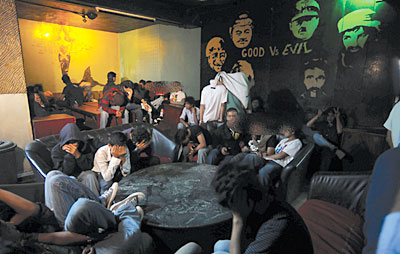 NARENDRA SHRESTHA |
If not for the demise of Girija Prasad Koirala last Saturday, the media would in all likelihood still be babbling about Babylon. The previous morning, police conducted a raid at the aforementioned disco in Sundhara, discovered 356 students hard at play, arrested them, and held them for six hours at the Mahendra Police Club before releasing them. The media had a field day, for they had been invited to the party.
Our minds are on loftier matters perhaps, and the media has been filling pages left, right and centre with coverage of Asia's 'tallest politician'. But come the weekend, parents will return to that age-old worry: what is my child up to?
The Babylon raid raised a few other worries: what were the Nepal Police and the media up to?
A raid is merited if police suspect illegal activities. So even if dancing is verily a human right, thus legal, opening a nightclub at 8 in the morning is not in Nepal. Whether you think that is right or not is beside the point; Nepali law states nightclubs shall only operate between 6pm and 12 midnight. To compound this, clearly there was underage drinking going on within Babylon's premises.
But why was it that the kids � as opposed to the proprietors and staff of Babylon � found themselves herded together like cattle, exposed to the media, and detained for the rest of the day?
It may be against school regulations, and far from ideal preparation for the future, to bunk classes for a bunker disco. But as far as I know, it ain't a crime. Are we really expected to believe that the police arrested the kids to test for drugs, and managed to process 356 samples in six hours? The results, they say, were negative. While waiting (with parents waiting outside), the good coppers 'interrogated' and 'counselled' their charges, presumably as part of their 'social responsibility'.
What was the real meaning of this raid, coming as it does on the heels of other crackdowns in dance bars across the capital? Is it part of the special security plan, or simply a particularly egregious example of moral policing from a police force that has demonstrated amply that it is totally amoral?
If the former, well, it beggars belief. I don't even want to start on a to-do list for New Nepal's finest, and everyone knows the police are in on what goes on in Kathmandu's entertainment venues. Why bust Babylon now?
If there were any doubts about the self-aggrandising and moral nature of the raid, the invite to the media dispelled them. Instead of simply closing down the disco, shooing away the kids, and informing schools and parents about the mischief their charges were getting up to, Nepal Police went for saturation coverage. Hordes of reporters were on hand to record the raid, and hounded the guilty parties (excuse me) inside and outside Babylon. Most, understandably, tried to shield themselves from the cameras, but as Narendra Shrestha from The Kathmandu Post noted, the reporters were relentless. "Ey gadha, show your face!" shouted one, and smirks were in evidence on the faces of both policemen and so-called journalists.
What will the kids actually learn from this traumatic experience? Judging by most of the comments on websites, there is a great deal of indignation, some of it misdirected ("bunk party pani jana napaune k") but most spot-on � doesn't the Nepal Police have anything better to do?
The absurdity of the raid and the manner in which it was conducted was perhaps best put by a blogger writing about the experience. She prefaces her comment with "I know it was wrong to bunk school but �" What if, she wonders, a stampede had ensued within the narrow confines of the disco? Why were the media there, harassing them as though they were "fish caught in a net"? Why did the raid take place now, when bunk parties have been going on for years?
This is of course not to imply that petty crime doesn't deserve attention. But it's blindingly obvious the state is trying to deflect attention away from its failures by seizing on an easy target. Why this was not so obvious to the hacks who came to feast upon the shame of Nepal's future is beyond me. Perhaps they'll find an answer in the
dregs of their Royal Stag the next time they find themselves in a dance bar.



